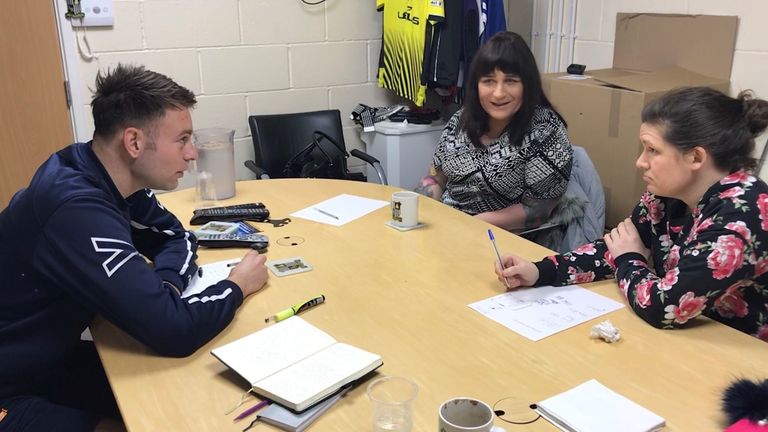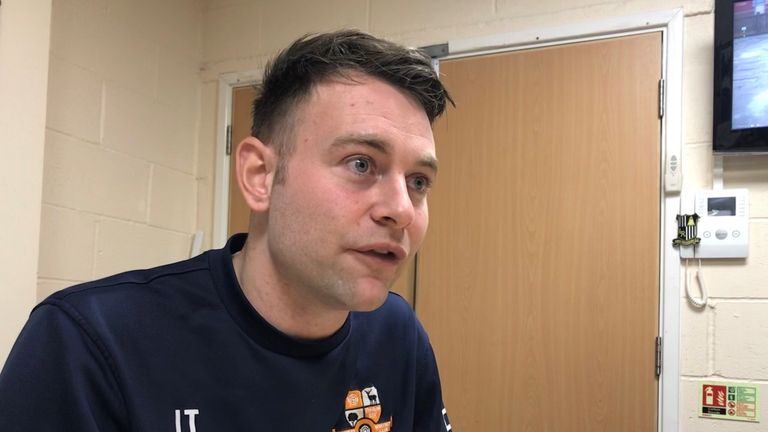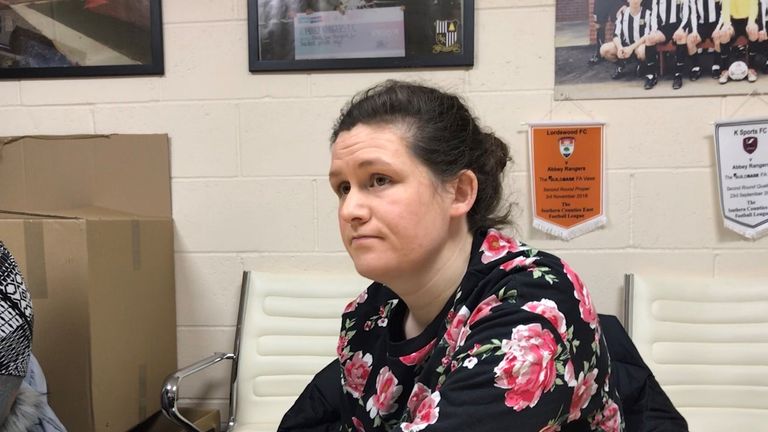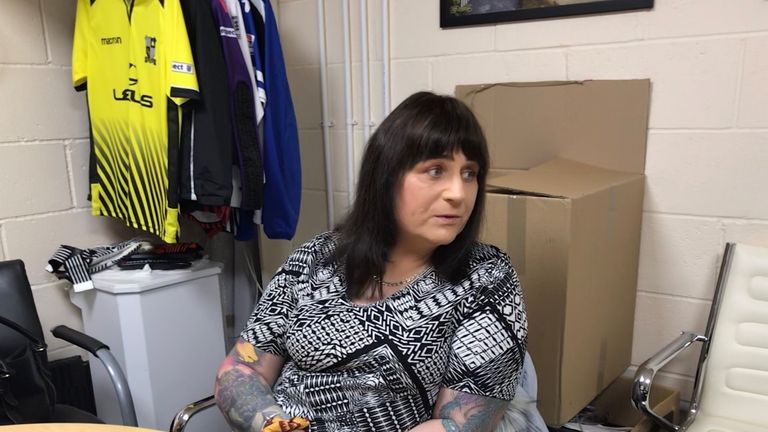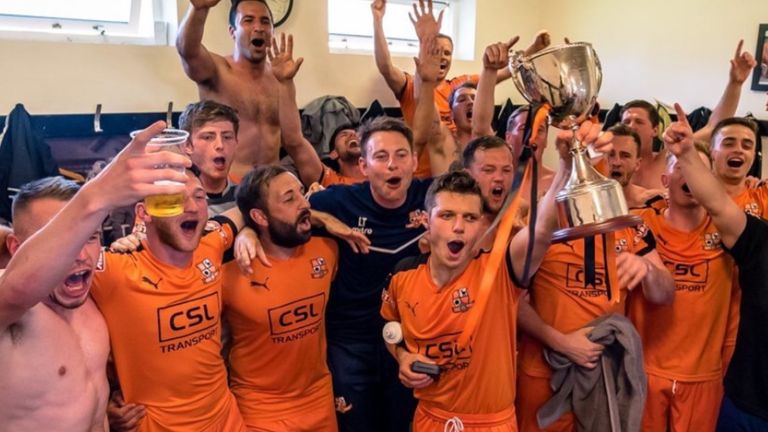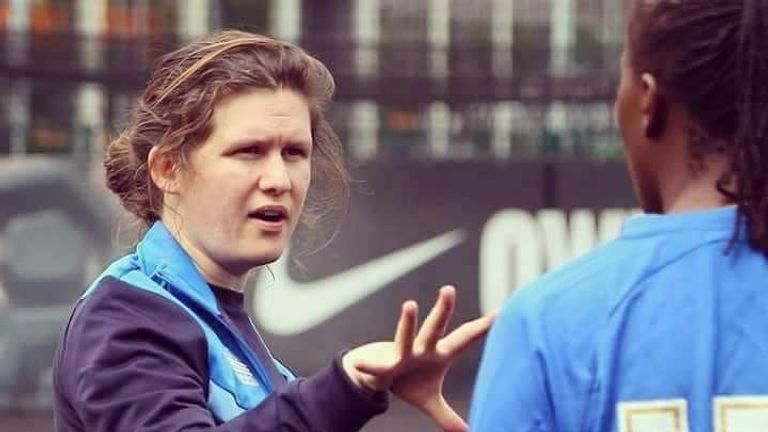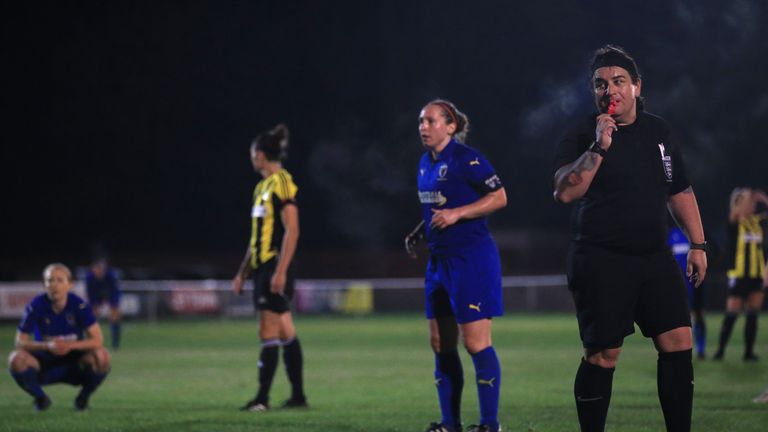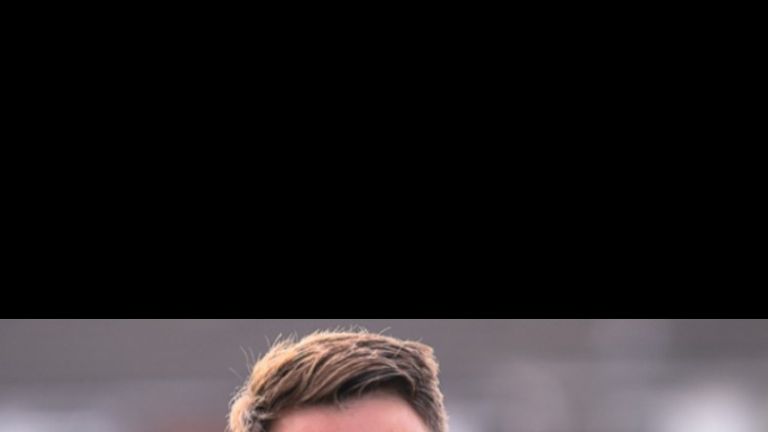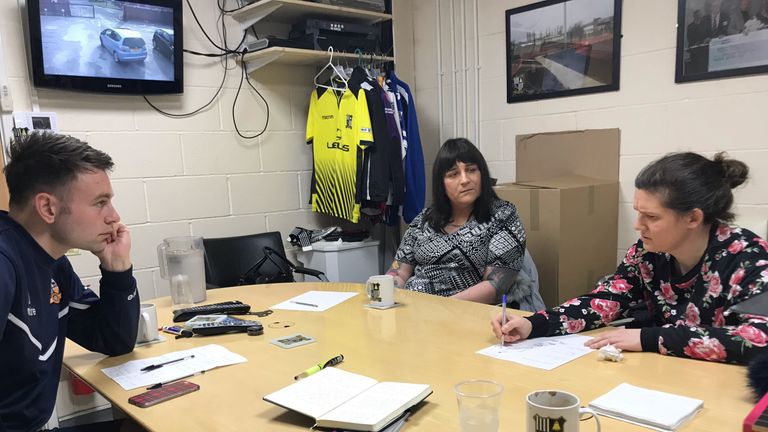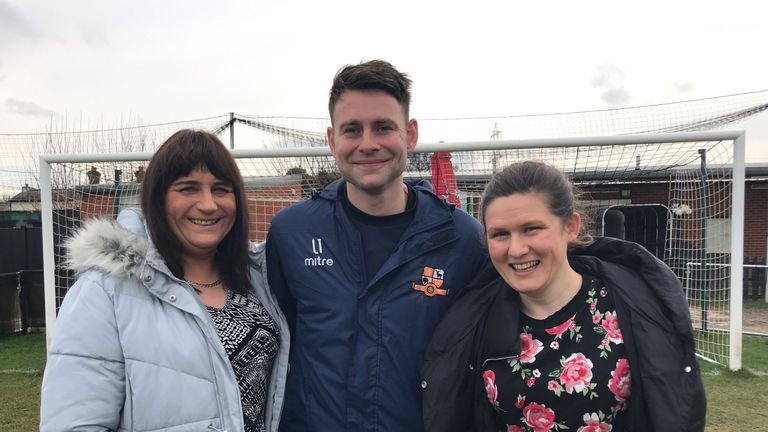LGBT in football: What's it like to work in the game when you're out?
Two coaches who are gay - one working in the Southern League, and one in women's and girls' football - join a referee who's transgender to discuss their experiences
Tuesday 12 February 2019 12:55, UK
Football's capacity for the unpredictable extends far beyond underdog title triumphs, giantkilling cup upsets and shock transfer signings.
Even in a conversation between two coaches and a referee, there are surprises in store.
This trio, sat around a boardroom table, are undoubtedly 'real football people' - that phrase often used to express respect and solidarity for those in the game with demanding full and part-time jobs, such as managers, club secretaries, groundsmen and women, and so on. Whether at the elite level or grassroots, they are fundamental to the structure of the sport, the cement between the bricks that make up the football pyramid.
In this instance, the individuals also happen to be LGBT people who are, to varying degrees, out in football. And while they welcome how that acronym unites them, the reality is that their experiences are truly diverse.
"For me, being gay has helped my career - massively." That's not what you'd expect to hear from a head coach, but for Luke Tuffs - a UEFA B Licence holder on the first-team staff at Hartley Wintney FC of the Evo-Stik League South, three steps below the EFL on the pyramid - it's his truth. Having come out as a teenager to his much older team-mates while playing for his local side Camberley Town, and finding himself accepted, he managed to side-step the uncertainty that other gay or bisexual people tend to struggle with, in their formative adult years.
Within the non-league scene, the 32-year-old is well connected and much admired, and his visibility has grown following media interviews given during a Hartley FA Cup run back in 2015. "There's been many other gay people in the game who have reached out to me for advice, or just to make a contact. As much as everyone else networks, we network and help each other out.
"I now work with the Football Supporters' Federation's Fans for Diversity campaign, which Anwar Uddin runs and which does fantastic work. The PFA invited me to observe their B Licence too - they don't get a lot of credit, but they've been brilliant with me."
Emma O'Connor is a similar age as Tuffs and is currently taking her UEFA 'B' while working for a disability charity after spells at four London clubs. Her football journey has been made trickier by those stumbling blocks of uncertainty. "It's taken me a long time to realise I'm gay," she says. "I only felt more comfortable coming out when I left my last club in April. I'm still not 100 per cent OK with it, to be honest."
O'Connor is also the Under-16 coach at Richmond Park FC, and a Chelsea season-ticket holder. Whether on the training pitch or the terraces, her passion for the game is clear. Yet she admits there has been a nagging, negative voice in the back of her head for several years. "The build-up since my university days to coming out meant a hit to my self-esteem, being involved in football. I've still got it in my head that it doesn't feel 'normal' - and I need to get rid of that."
It's that process of confidence building which has helped bring Lucy Clark into the conversation, taking place at Abbey Rangers FC in Addlestone. Since taking up refereeing in 2004, she has officiated in many fixtures at the Surrey club and countless others nearby in the Combined Counties Leagues, as well as games in women's football, at U18 level and in Sunday leagues. She's been in charge of around 50 games since coming out publicly as transgender six months ago. "I sat in this exact boardroom right at the end of last season. And now I'm sitting in here again, and it's as me."
Clark is steeped in the Greater London football set-up, having both played and managed before becoming a referee. "Being trans, and only coming out last August, I've sort of lived two different lives. Football saved my life, but then it held me back as well, later on. The plan was going to be to give it all up. I just felt that I couldn't continue with my transition and continue to referee."
However, her close friends and family urged her not to give up, knowing how walking away from the sport she loves would affect her. "So I went to the FA and told them, 'this is me - the football world now needs to know who I am as well.' And I have to say, they've been great."
Clark will be back at FA HQ at Wembley on Tuesday, alongside Tuffs, speaking on a panel at a seminar event called 'Stronger Together'. It's being run by the football campaign organisation Just A Ball Game?, in partnership with the PFA, Kick It Out, the University Campus of Football Business (UCFB), trade union GMB, and other groups. Discussions on the day will explore how LGBT+ inclusion in football is improving through collaborations with other sectors, celebrating the diversity that is inherent in the game, while tackling instances and attitudes of prejudice. Later, the FA will host its annual reception to mark LGBT History Month in the UK, with this February also marking the 10th anniversary of the Football v Homophobia campaign.
Those in attendance at the national stadium who have perceptions and expectations of what it might be like to be out in football may be pleasantly surprised when they listen to Tuffs and Clark tell their stories of acceptance at semi-pro level in the men's game. Yet both would be quick to point out that they cannot speak for others, only themselves, recognising that many LGBT people in football do encounter difficulty to varying degrees, with O'Connor an example of this.
Additional to his first-team role at Hartley, Tuffs is the Academy Manager of Pulse Premier, an education and football development programme for 16 to 18-year-olds based at Abbey Rangers. He's also Hartley's youth-team manager and works with their junior sides. Together, it means he's coaching a wide age range, from those in their mid-teens up to senior pros. The question of how to best help a player who is coming to terms with their sexuality is one he is often asked. His response is always rooted in reality.
"I'm very much in the culture," he says. The dressing-room environment of team sport, whether at Hartley's level or higher up, is of course unlike more 'traditional' workplaces - it's a space that's pressured and internally competitive, particularly in men's football, but also one where camaraderie can flourish, and long-lasting friendships are forged. Each group may have its own code, with big personalities setting the tone and often the boundaries too. It's Tuffs' job to help his young charges navigate this world.
"I've been in many dressing rooms, and the only successful ones are those that are hungry, and have that pack mentality," he explains. "With younger players, I try to develop them for that. You either sink or swim - and to succeed, you have got to swim. Those coming through are going to have to be thick skinned.
"However, if it's a case of bullying, that's very different. I know my players and I know my dressing room. If someone's getting it more than someone else, and it crosses the line, you put a stop to it. If it's the case that they need to be a little bit thicker skinned, and everyone in there is getting it the same, then I'm going to teach them how to deal with that."
Tuffs accepts he is hardened to certain language, words that could make a closeted gay player retreat into his or her shell, particularly if misused or taken out of context. Inevitably, the grey area of 'banter' looms large; Tuffs' technique for those who are uneasy is to try to teach acceptance, both of the self, and of the culture. "I don't want it to change. Genuinely, the dressing rooms where people get stick are the most together. If I'm always worried that someone will get offended, what I can or can't say to someone, then that's not real friendship and you'll never have that closeness."
O'Connor recognises those benefits of togetherness but in coaching girls, her focus has to be primarily on participation. "There needs to be a team spirit and that can get you through games, but sometimes it can cross the line.
"As a coach, you're a role model but you're also seen as a counsellor as well. It's about knowing your players, and understanding their mental health. I don't like the word 'banter' with my U16 girls, because some players have said that they're uncomfortable with the way certain words are spoken."
All mention specific derogatory terms for LGBT people that they would never allow to go unchallenged, and there's an agreement around the table of the many variables involved in where to 'draw the line' on banter. Clark's identity has been new to many people she has met over the course of the season, and she is accommodating to each situation. "I'm still refereeing the same clubs, the same players, meeting the same chairmen, and they all knew me as this other person. But I wasn't me then.
"I know I'm going to get misgendered sometimes, especially when I'm going to referee, because I'm pulling my hair up and I'm not wearing makeup. I accept that. But it's been really respectful."
Clark says there is banter in the referees' room too, and welcomes any good-humoured teasing that makes people relax around her. At many fixtures, she represents the first trans person those individuals have ever met. "Before one game, an assistant had forgotten his shorts, so I chucked him a spare pair of mine. He started putting them on, and I said 'you know you're officially a cross-dresser now, don't you?'
"We can't be uptight, or worse, let people think we've got a chip on our shoulder about being who we are, because that's when you'll struggle."
On or near the terraces, when surrounded by strangers, an LGBT person who is out in football may not experience the same bond and familiarity they would get with friends behind dressing-room doors, which makes the dynamic very different. "They don't know you, and you don't know them, so there isn't that consent or circle of trust" says Tuffs. O'Connor cites the homophobic abuse directed at Macclesfield manager Sol Campbell by a section of Cheltenham fans at a recent game. She's hooked on Chelsea but says the stands are somewhere she always feels wary.
"Away fans chant 'rent boys' at us, for example. I don't think I'd ever feel comfortable going to a Chelsea game and holding my girlfriend's hand - not kissing, or showing affection. I've been to about 700 Chelsea games and when I'm there, I'm 'straight'. It's like I've still got to hide that away."
Clark concurs. As an Arsenal season ticket holder, going to games means trying to blend into the crowd. "I'm very androgynous with how I dress. I might have a bit of mascara on, and that's really it. You don't want to put yourself in that position."
Tuffs recalls an incident at a Hartley game over a year ago, when members of the opposition bench tried to show they knew he was gay in order to unsettle him, only to then embarrass themselves. "They pointed at me and said 'there's that tranny!' I said back, 'I'm not trans, I'm gay'... lots of people heard it and asked me if I was going to report it.
"I was worried about doing that, because I didn't want people to think I get offended easily. But my club and the chairlady all told me to report it. Also I have a couple of friends who are trans, so I thought about them too. I realised it would be a bit selfish of me if I didn't report it, so we brought it to 'FA court', and it all got sorted out.
"I found it difficult though. One of the perceptions about gay people, I feel, is that we're easily offended. That is a perception that I'm determined to destroy."
The consensus in the group is that while punishments have their place, education must be the outcome. Simply through their visibility, Tuffs, O'Connor and Clark are among the people showing that while identifying as LGBT in football may not be common, it's far from career-ending. Coaching and refereeing are different to the playing side, however, and certainly in the men's game, that is where the focus is most intense.
Tuffs says a player's first concern is always going to be his future. "I know a few people higher up in the game who are gay, and I think you'll find the main thing they think about is 'am I going to get another contract?'
"The chances of a pro getting another contract are very low as it is, so though open homophobia is not tolerated, people may still hold those views. A manager looking at a player he knows or thinks is gay might just say, 'oh, we won't sign him, he's not quick enough'.
"Quite simply, the game will change on this, but when our current younger generation becomes older. Is that good enough? It might be that's just how it is."
In the women's game, says O'Connor, it's more a question of accepting yourself as being lesbian, gay or bisexual. "It's different between youth girls and ladies too. Some of my younger players are maybe beginning to question their sexuality now.
"For me, as a coach, I'm always cautious on what I say. I write down team talks and stuff like that. I'm looking more at my own reflection after a training session and trying to give the best of me for these girls. I like to think my coaching has already improved since September."
Is it too early to talk about an LGBT community within football? Clark thinks the foundations are being built. "It's minimal, at the moment. We could possibly get everyone who's LGBT and out and is involved in football, at a semi-pro or pro level, in a room, and still have plenty of space! Hopefully more people will show that they're part of it."
Tuffs points to the proliferation and success of LGBT-inclusive football clubs up and down the UK, particularly in the capital. He's played for the London Titans on and off in amateur leagues for over a decade. "When I joined the club, I suddenly made about 40 friends who were gay. As a 19-year-old, that was huge for me. If you're a gay person that happens to like football, getting involved in something like Titans is one of the best things you'll ever do.
"The LGBT community in football is growing, and it's clubs like Titans that are the very visible part of that. But there are also those who aren't visible, and we all talk and look out for one another."
Tuesday's events at Wembley will continue the conversation between this particular set of football people - a group that's as real as any other, and one that's stronger together.
Sky Sports is a member of TeamPride and supports Stonewall's Rainbow Laces campaign.
Contact us at Sky Sports if you'd like to share a story to help raise awareness around LGBT inclusion.
